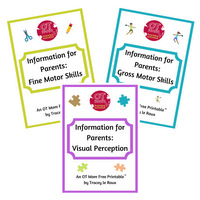- Home Page
- Sensory Processing
- Sensory Integration Activities
- Dealing With Picky Eaters
Dealing With Picky Eaters
Dealing with picky eaters is a topic close to my own heart, as two of my kids used to be fussy eaters. I have to confess it was a real challenge for us as a family.
Here, I offer some insight from my background in occupational therapy, as well as some strategies that worked for me as a parent!
I sometimes link to products (#Ad) that are similar to those I use and love. If you do purchase something through my links, I will receive a small commission that helps support my site - thank you!
Key Takeaways For Busy Parents:
- Understand the root causes: identify if sensory integration and processing is a factor. Are there physical issues at play (eg swallowing issues)?
- Respect your child's responses: aim to create a supporting eating environment.
- Start small and be creative.
- Accept that progress takes time - celebrate small victories.
- Prioritize your child's overall health and well-being over society's expectations. Don't take rejection of your food personally!
A) Understanding "fussy" eating from an OT perspective
B) Tips for dealing with picky eaters:
This page contains affiliate links (#Ad). I earn a small commission if you purchase something through my links; however, you are under no obligation to purchase anything!
Understanding "Fussy" Eaters From An OT Perspective
If you have a child who is a fussy eater, you have probably read lots of parenting articles on the topic already. The answers may have ranged from "typical toddler behavior" to "control issues".
But from an occupational therapy perspective, things can look a bit different.
Many kids are fussy eaters because they are struggling with sensory processing issues.

Differences in Sensory Integration and Processing can affect a child's eating habits in different ways:
- a child who is over-sensitive to sensations in the mouth (also called oral defensiveness), may gag on solid food and avoid strongly flavored food. Food which is lumpy can also cause gagging.
- some kids are oversensitive to the smells of food, and seek out bland food as a result.
- a child who is sensory-seeking may dislike bland or soft food and only eat food which is very crunchy, textured or highly flavored.
- a child who has a sensory-based motor disorder may struggle with the coordination skills needed to use a spoon or knife and fork, and may avoid food that takes too much effort to eat.
- some children with low muscle tone or poor oral motor coordination may struggle to chew and swallow, and may therefore prefer food which does not need to be chewed.
If this is a new concept for you, and you realize your child may be struggling with sensory integration and processing, then find a sensory-trained occupational therapist in your area to assess your child.
You can also read these excellent books on Sensory Processing to find out more:
- Sensational Kids: Hope and Help for Children with Sensory Processing Disorder (SPD)#Ad
- Raising a Sensory Smart Child: The Definitive Handbook#Ad
Tips for Dealing with Picky Eaters
There are no tried and trusted methods that will work for every child. But here are some tips and ideas that you can try.
This is by no means an exhaustive list, just a few that worked for dealing with picky eaters in my own family as well as others I have worked with!
1) Understand WHY Your Child Is Fussy
I think one of the most underrated steps in dealing with picky eaters is to try and understand WHY they are picky.
If you understand WHY your child is struggling with food, it becomes less personal. I know how easy it is to feel upset when your child rejects your painstakingly prepared meal, but usually the issue is beyond their control, especially when they are young.
- A child who is "over-responsive" to sensations (this usually affects other areas of their life as well, such as dressing, reactions to noisy environments) experiences almost all sensation as threatening. This response is on a subconscious level and cannot be overridden by reason when they are young.
Gagging and even vomiting are primitive responses to a taste, smell or tactile (texture) sensation perceived by the brain as dangerous.
- On the other end of the sensory spectrum, a sensory seeking child may feel the need to get stimulation through food that is "intense" (super crunchy, super flavored etc). They may thus seek out these foods and refuse to eat bland, soft food.
 Exploring the sensations of food
Exploring the sensations of food- Another reason why some kids are fussy is simply because chewing and swallowing is exhausting for them. One of our kids was a picky eater, and incredibly slow to finish any meals, even meals he liked.
When he was about 11, we took him to be evaluated for orthodontic braces, and one of the first things the orthodontist did, was to give him an orthodontic plate and got him to practice a swallowing technique.
Turns out that our son's slightly recessive lower jaw had made chewing tiring for him. Combined with a poor swallowing technique, this had resulted in slow eating, and avoidance of foods that required chewing.
If your child is a slow eater, and avoids meat and other chewy food, it may be worth investigating whether there are orthodontic and swallowing issues.
The most important thing is to try and understand WHY your child may be fussy, and don't take it personally.
2) Take Baby Steps To A Healthy Diet
Our ultimate goal should be for our kids to eat a healthy balanced diet!
We are bombarded by a variety of food choices in our modern age, but our
ultimate goal is not to have a child who eats everything, but one who is
healthy, and who makes healthy food choices.
Once you have figured out WHY your child struggles to eat well, and you are taking steps to help them desensitize, or to cope with their sensory processing issues or to develop coordination skills, then take these baby steps to a healthier diet:
 Baby steps to a healthier diet
Baby steps to a healthier diet1) Make a list of everything they DO eat (a good list to have on hand for caregivers).
2) Assess which nutrients are lacking.
- Is there a lack of protein and vegetables/fruit?
- Too much sugar?
- Too much salt?
3) Can you offer healthier choices to current foods?
- Can you switch to a healthier brand of peanut butter?
- A cereal that is just as crunchy but has more fiber?
- Can you mix the sugary cereal with a brand with less sugar?
- If peanuts are an acceptable food, can you introduce almonds and other nuts?
- If raw apple is acceptable, can you introduce a vegetable or fruit with a similar texture (eg raw carrots)?
4) Can you change the way food is presented? Be creative in how you present the food - try making pictures, cutting it into fun shapes etc.
5) Can you change who does the feeding?
- If your child is currently being fed by you, try finger foods that he/she can put into his/her own mouth.
- Alternatively, if your child is doesn't like handling food, or struggles to use utensils, then try using funky self-feeding spoons#Ad or even feeding him/her new foods yourself.
3) Respect Your Child's Responses
- If your child cannot handle soft squishy food right now, then don't force it. Seek help to work on the underlying reasons for the aversion (Sensory Processing Differences).
- If your child needs the food to "not touch", then buy some picnic plates with compartments#Ad.
- If your child hates sauces, dish a portion up before you add the sauce to the pot.
- If your child struggles with fine motor skills or has poor coordination skills, invest in some eating aids to help with mealtimes. Try chunky self-feeding cutlery#Ad, like these ones from Amazon.
- At least one meal each day should be one that your child enjoys - don't make every meal hard for your child and for you.
- Don't punish your child for being unable to eat something, (but obviously don't accept willful misbehavior like dumping the food on the floor).
- Keep healthy food on hand - a hungry child may try something new in desperation!
- Have one day a week when your child can enjoy every meal - for us, Sundays are our "special" food days, where our kids know they won't be asked to eat something new!
 A happy eater!
A happy eater!- Give a choice where possible. We often had "buffet style" meals on Sundays, where our kids
could choose their food from a range of healthy options. This worked brilliantly
for guests with dietary issues as well as for our fussy eaters!
4) One Bite At A Time
A key concept in dealing with picky eaters is to introduce one new food at a time, over a period of time, and to not ask your child to eat a plate full of new food!
This means that most of the plate should contain food that your child is happy to eat, with a small portion of the plate containing the "new" food.
With younger kids (under 4 years), I would just keep offering new foods, but not forcing them to eat it if they say no.
Once your child is emotionally mature enough for you to negotiate/reason with them (usually between the ages of 3-5 years), then you can start using incentives and introducing a new food to 'try".
This food needs to be tried ("you don't have to like it, you just have to try it") before the rest of the meal can be consumed. Although there are some experts who don't think this is a helpful way for dealing with picky eaters, it is a method which did work for one of the kids in our family.
For example:
My 5 year old son was happy to eat pasta and chicken breast meat, so I would put that on his picnic-compartmentalized plate along with his fruit, and then give him one small bite of something he had to eat before he could get on with the rest of his meal.
Sometimes it would be a tiny cube of carrot, sometimes it would be a small piece of pasta with a dollop of sauce. I gave him plenty of milk/water to wash it down, and lots of time to get it down. When it was done, then he could start his regular food.
Repeated, regular exposure to little carrot pieces resulted in his being able to eat 4 or 5 carrot wheels at a meal a few years later, and now he eats regular sized portions. Yay!
You can also check out Alberto Moreno's additional tips and strategies for picky eaters.
5) Try Incentives For Picky Eaters
- You could use a plateful of "safe" regular food, as the incentive to trying "one bit", as I described above.
- Or give a yogurt/favorite healthy snack as an incentive to finish a whole meal.
- Some children may try a new food when seated on an adult's lap - the security of the hug makes the new food less scary.
 Sitting on a lap may make new food seem less scary
Sitting on a lap may make new food seem less scary- Introduce new foods in a fun setting, such as a picnic, in a park or in another situation where your child is relaxed and happy.
- Try a star chart for every bite of new food that was tried.
- You can also try using food cutters#Ad to cut food into interesting shapes!
 Your child may try new food at a party
Your child may try new food at a party6) This, Too, Shall Pass!
A word of encouragement to those dealing with picky eaters:
It DOES get better!
One of my boys struggled with many areas of sensory over-responsiveness, and feeding was a huge struggle for him. He did not latch until 24 hours after birth, and then refused to take anything but the breast - no dummies or bottles.
He gagged and vomited when I introduced baby food, and only started accepting solids at 9 months - and only finger foods!
 An acceptable food - dry cereal!
An acceptable food - dry cereal!Although he struggled with the textures of food for many years, and his diet was a little less varied than that of his peers, it was still healthy and balanced. Every year, he added a couple new foods to his diet. As a Boy Scout, he had to learn to eat the camp meals, as well as cook his own food, and he now eats a much more varied diet. He still prefers simple foods but is mature enough to try other foods and enjoy them.
So... this, too, shall pass!
7) Pick Your Battles and Count Your Victories!
Parenting is not easy, but it is not meant to be a battlefield.
As parents, we need to beware of forcing our kids to conform to what "society" expects of them, in order to save our own pride.
I know from experience it is socially awkward and sometimes downright embarrassing to have kids who don't eat what other kids eat.
I had to learn to swallow my own pride - their struggles are NOT a reflection of my abilities as a mother!
 Messy but good!
Messy but good!In dealing with picky eaters, it really helped me to have a standard explanation of sensory processing that I could use, to explain to anyone who asked. More people are aware of sensory processing these days, and saying "he has sensory issues" usually meets with an understanding nod or a commiserating smile!
I also learnt to rejoice in what my kids COULD do well. So what if they are nibbling on bread, while the others are eating sausage and mash? It was more important to me that they were kind and considerate in their playtime with others.
Don't make mealtime another battleground that they have to face - for their sanity and yours.
And count your victories! I actually took notes of these particular victories :-)
- the year two kids learned to eat potatoes and carrots in decent portions, as well as brown rice (instead of white)
- the year one kid learned to eat bananas!
There have been many more victories since then, and I confess each new food accepted received a little celebration!
They may be small victories, but they are significant when you are dealing with picky eaters in your family!
Thank you for visiting my site! I hope you were helped by these tips on dealing with picky eaters!
Why not sign up for my occasional newsletter to keep up to date with new pages and activities on my site?
- Home Page
- Sensory Processing
- Sensory Integration Activities
- Dealing With Picky Eaters
Share this page to help others!
Didn't find what you were looking for? Try a search of my site!







